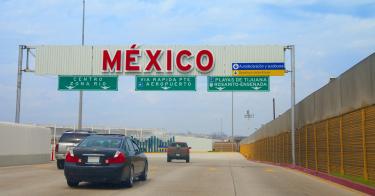The new president’s ambitious “America First” strategy means that Donald Trump intends to act in the best interests of the United States. Our friends and allies should find this course reassuring rather than threatening.
Few things are more important than having friendly, prosperous and secure neighbors on both sides of the border. The first scheduled meeting between Trump and Mexican President Enrique Peña Nieto’s has now been postponed. But when the two leaders finally do get together they will have lots to talk about, with pressing issues including trade, border security, and immigration.
In addition to geographic proximity, the U.S. and Mexico’s longstanding diplomatic ties, high levels of trade, and growing demographic and cultural ties have resulted in a strategic alliance and a vital economic partnership. While challenges exist, their presidents’ eventual meeting will provide an opportunity for both countries to advance mutual interests.
Rather than looking to accentuate disagreements, both sides should focus on advancing the bilateral relationship. Getting these issues right is of vital importance to both countries.
Challenges and Accomplishments
Certainly each agenda item presents serious challenges. Border security clearly needs to be improved. At the same time, the United States must also enforce its immigration laws and reform its immigration system. Internally, President Trump cannot ignore the Americans whose economic circumstances have declined since the North America Free Trade Agreement was enacted.
Yet there have been significant achievements in the bilateral relationship. From counter-crime to anti-terrorism cooperation, Mexico has been an invaluable asset to U.S. national security efforts. U.S. and Mexican security forces work tirelessly to dismantle powerful organized criminal networks.
Prior to NAFTA, U.S. exports to Mexico hovered around $42 billion. Today, that total is nearly $270 billion. Imports from Mexico have increased as well, and Americans produce 40 percent of the content of those imported goods. No other country comes close -- Canadian exports have only 25 percent U.S. content, and Chinese exports contain less than 5 percent.
It is important, too, to recognize the current challenges facing Peña Nieto -- especially those that could blow back to impact the United States. Lackluster economic growth, continuing security crises, and a slow implementation of landmark reforms have weakened Peña Nieto’s administration. As he begins the last year and half of his presidency, polls show that only 12 percent of Mexicans approve of his performance; that’s half of what the rating was just a month ago.
The sharp decline in favorability can be traced to the government’s fuel price hike, known in Mexico as el gasolinazo. The 15-20 percent price increase sparked massive demonstrations throughout the country, many of them violent. To date, six people have been killed, including a police officer.
Complicating the situation is the continuing depreciation of the Mexican peso. While the currency has been on a downward trajectory since mid-2013, uncertainties about President Trump’s position on Mexico and trade have driven the peso even lower.
Peña Nieto’s political enemies are wasting no time capitalizing on his weakness. The same poll that showed his approval ratings cratering found that 27 percent of Mexicans support Andres Manuel Lopez Obrador, leader of the leftist MORENA party. AMLO, as he’s popularly known, was almost elected president in 2006. He lost by less than 1 percentage point. His anti-free market and anti-American rhetoric have many likening him to the deceased Venezuelan socialist leader, Hugo Chavez, and he’s currently the leading 2018 contender.
Common Causes
In updating NAFTA, a major goal should be to enhance the economic freedom of citizens in all three countries. Trade deficits should not be regarded as accounting standards to measure the success of trade agreements. To do so assumes that unless the United States has a trade surplus in goods against a country, it is at a disadvantage in the relationship. That is not the case. To assess the success of any trade deal, we must look at services and investment as well. In those areas the United States clearly has benefited the most from NAFTA.
Mexico faces considerable security and rule-of-law challenges, which must be addressed. Peña Nieto’s efforts to curb violence throughout the country have been relatively unsuccessful, yet Mexico’s willingness to continue work with U.S. law enforcement and intelligence counterparts bodes well for the future. We saw as much with the aptly timed extradition of Joaquín "El Chapo" Guzmán.
Improving border security will also require a cooperative, two-fold effort. Expanding the physical infrastructure and dedicating advanced intelligence and surveillance assets is a necessary part of the equation. Those initiatives should also be accompanied by projects to facilitate cross-border trade.
We must also support Mexico’s efforts to control their southern border with Guatemala. Large-scale unlawful migration to the United States originates largely from El Salvador, Guatemala, and Honduras. Following the 2014 border crisis of migrating, unaccompanied minors, Mexico has clamped down on its southern border at great political and financial cost. Cooperation between U.S. and Mexican authorities on the growing number of Asian, African, and Middle Eastern migrants should remain a national security priority, too.
On Jan. 7, a U.S. diplomat was shot in Guadalajara, Mexico. Working with their American counterparts, Mexican authorities led the manhunt for the culprit. Within three days, the suspected shooter, an American citizen named Zia Zafar, was captured, deported and arraigned in a Virginia court. It wasn’t luck that produced this swift result. Successful outcomes like these arise from decades of effective cooperation. The success of “America First” depends upon relationships like these.
This piece originally appeared in RealClearWorld



